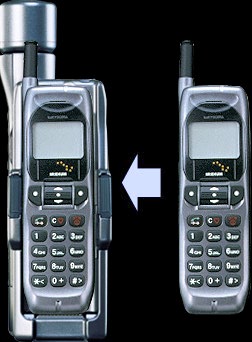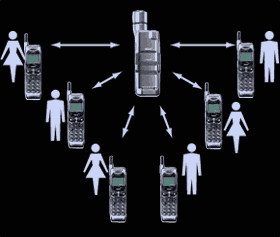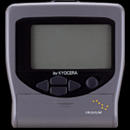
![]() The Iridium project brings with it a mountain of innovations
in the form of more efficient production techniques, aeronautical services,
SIM (Subscriber Identity Module) cards, and new services and functions
of the Iridium phones and pagers.
The Iridium project brings with it a mountain of innovations
in the form of more efficient production techniques, aeronautical services,
SIM (Subscriber Identity Module) cards, and new services and functions
of the Iridium phones and pagers.
![]() A prime example of an innovation within an innovation
is the mass production of the satellites. Before the
project, satellite production was likened to that of car manufacturing
in the pre-Henry Ford era. The satellites previously
required extensive testing and were very labor intensive.
Engineers at Motorola's
A prime example of an innovation within an innovation
is the mass production of the satellites. Before the
project, satellite production was likened to that of car manufacturing
in the pre-Henry Ford era. The satellites previously
required extensive testing and were very labor intensive.
Engineers at Motorola'sSATCOM
station in Chandler, Arizona produced a new method of manufacturing
from eight to ten satellites at one time on the assembly line.
They also were the first to use the Just-In-Time (JIT) philosophy for synchronizing
parts supply (borrowed of course from the Japanese car manufacturer Toyota).
How will this affect us? These new methods employed will eventually
drive down costs for the producer (Moore's Law) as well as the consumer
making global communication more affordable .
![]() Iridium aeronautical services will provide voice,
facsimile and data services to travelers on commercial and general aviation
Iridium aeronautical services will provide voice,
facsimile and data services to travelers on commercial and general aviation  aircraft.
Because airlines are constantly trying to improve services for their customers,
this will be a huge marketing point. Customers currently cannot use
cellular or satellite phones on the aircraft because the radio waves may
interfere with an aircraft's control and navigation system. To view
one of these data devices click
here. Customers will actually be able to send or receive
a facsimile as well as retrieve messages while in the air. This service
will also increase safety because pilots will have another way to communicate
with each other. One of the devices that will make the aeronautical
service possible is the SIM card.
aircraft.
Because airlines are constantly trying to improve services for their customers,
this will be a huge marketing point. Customers currently cannot use
cellular or satellite phones on the aircraft because the radio waves may
interfere with an aircraft's control and navigation system. To view
one of these data devices click
here. Customers will actually be able to send or receive
a facsimile as well as retrieve messages while in the air. This service
will also increase safety because pilots will have another way to communicate
with each other. One of the devices that will make the aeronautical
service possible is the SIM card.
![]() Each Iridium customer will be issued SIM cards which
is a type of "smart card" with a microprocessor with non-volatile
memory and can also be used for financial transactions.
It will ultimately replace cash, credit cards, frequent flier cards, passports
and other forms of identification. On a commercial flight, thee customer
will insert the SIM card into the installation in front of him making the
airborne telephone operate as the subscriber's personal telephone.
This will automatically register the subscriber with the Iridium System
and will route incoming calls to the correct on-board telephone.
The originator of the call will not even know that his call is being routed
to an airplane!! The unit will allow the walk around the airplane
"roaming" in the same way that GSM cellular networks work.
The customer will also be able to retrieve stock quotes, make hotel reservations
or travel info, as well as check the latest score for UT football.
Each Iridium customer will be issued SIM cards which
is a type of "smart card" with a microprocessor with non-volatile
memory and can also be used for financial transactions.
It will ultimately replace cash, credit cards, frequent flier cards, passports
and other forms of identification. On a commercial flight, thee customer
will insert the SIM card into the installation in front of him making the
airborne telephone operate as the subscriber's personal telephone.
This will automatically register the subscriber with the Iridium System
and will route incoming calls to the correct on-board telephone.
The originator of the call will not even know that his call is being routed
to an airplane!! The unit will allow the walk around the airplane
"roaming" in the same way that GSM cellular networks work.
The customer will also be able to retrieve stock quotes, make hotel reservations
or travel info, as well as check the latest score for UT football.
![]() The most impressive innovations of the Iridium project are the services
and features of the new phones. One of the key components and
major marketing points is cell compatability.
The most impressive innovations of the Iridium project are the services
and features of the new phones. One of the key components and
major marketing points is cell compatability.
 The
Iridium Dual Mode will offer service simply by docking Iridium-capable
handsets. It will enable the customer to take advantage of the Iridium
satellite network while having the option to use the local cellular network.
This will be perfect for companies who can issue separate phones for local
calls and use the port for international and global calls.
The
Iridium Dual Mode will offer service simply by docking Iridium-capable
handsets. It will enable the customer to take advantage of the Iridium
satellite network while having the option to use the local cellular network.
This will be perfect for companies who can issue separate phones for local
calls and use the port for international and global calls.

![]() Other new features of the phones will include a world alarm timer where
the phone will automatically set itself to the current local time where
you set up the handset. There will be an answering service function
capable of recording up to 255 messages. With this will be a Drive
Mode Function which, when activated, politely explains to any caller that
the user is busy driving. Another innovative feature is the "memo
while calling" which will allow the user to put the incoming caller on
hold in order to record the important phone number just recited.
There will be a separate vibrating device available so that the user will
not have to worry about those noisy interrupting calls. The user
can also put the phone on privacy mode to adjust microphone sensitivity.
If the user decides to go hiking out in the mountains he can use the sollar
supply kit and run on a natural resource.
Other new features of the phones will include a world alarm timer where
the phone will automatically set itself to the current local time where
you set up the handset. There will be an answering service function
capable of recording up to 255 messages. With this will be a Drive
Mode Function which, when activated, politely explains to any caller that
the user is busy driving. Another innovative feature is the "memo
while calling" which will allow the user to put the incoming caller on
hold in order to record the important phone number just recited.
There will be a separate vibrating device available so that the user will
not have to worry about those noisy interrupting calls. The user
can also put the phone on privacy mode to adjust microphone sensitivity.
If the user decides to go hiking out in the mountains he can use the sollar
supply kit and run on a natural resource.

![]() And finally, not to be left out, are the new features and services with
the Iridium pagers. The new pagers will be capable of receiving
alpha-numeric messages of up to 80 charaters. The user will be able
to communicate in up to 19 different international languages and store
up to 99 messages due to the 128 KB RAM
And finally, not to be left out, are the new features and services with
the Iridium pagers. The new pagers will be capable of receiving
alpha-numeric messages of up to 80 charaters. The user will be able
to communicate in up to 19 different international languages and store
up to 99 messages due to the 128 KB RAM  memory.
If unable to reach an Iridium customer by phone he can automatically leave
a message via the Global Notification Service (GNS). Finally
the user will be able to use a network where he can be reached anywhere
in the world on one global number and he will only receive one telephone
bill.
memory.
If unable to reach an Iridium customer by phone he can automatically leave
a message via the Global Notification Service (GNS). Finally
the user will be able to use a network where he can be reached anywhere
in the world on one global number and he will only receive one telephone
bill.
To go back to the TOP,
click here.
To learn about the detail
of operations involved with this project click here.
To go back to the HOME PAGE,
click here.